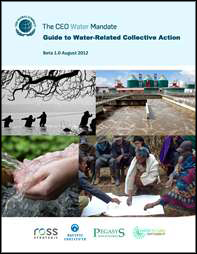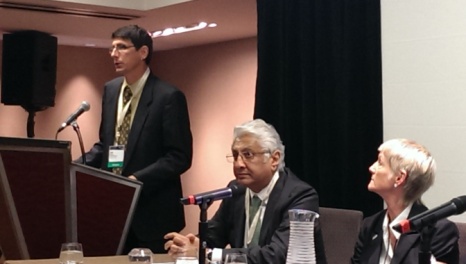|
|
October 2013 Online Update
|
|
|
|
Water-related risks are shared among business interests, governments, civil society groups, and local communities. The Pacific Institute has long focused on facilitating equitable processes through which companies and stakeholders can collaborate and leverage the collective strengths and insight of all involved parties to produce more informed and durable outcomes, build and maintain legitimacy with critical stakeholders, and mitigate water-related risks and impacts in a robust manner. The CEO Water Mandate has released the updated Guide to Water-Related Collective Action - an important tool in this endeavor. In its most productive form, collective action leads to a strong sense of shared interests, shared responsibility, and shared benefits.
|
|
Guide to Water-Related Collective Action Helps Businesses Engage
 The UN Global Compact's CEO Water Mandate initiative has released the Guide to Water-Related Collective Action, which helps businesses develop strategy focused on effective, sustainable, and equitable external engagements related to water. The UN Global Compact's CEO Water Mandate initiative has released the Guide to Water-Related Collective Action, which helps businesses develop strategy focused on effective, sustainable, and equitable external engagements related to water.
The Guide helps a company identify which form of collective action is most suitable for the situation, addressing both expectations management and clarity of communication with key interested parties, two factors critical to success.
"Effective collective action is critical toward realizing the principles of responsible business engagement with water policy - and the principles are themselves a critical element in achieving credible collective action," said Jason Morrison of the Pacific Institute, who serves as the Technical Director of the CEO Water Mandate. "The bottom line is that water-related challenges are often shared among government, business, communities, and the environment. Facilitating equitable processes through which all affected parties can come together to mitigate these shared risks or pursue other improvement opportunities is a powerful tool for combating our mounting water challenges. The Guide will support companies' efforts to achieve this alignment of action."
The Guide to Water-Related Collective Action can be used in conjunction with the CEO Water Mandate's Water Action Hub, the world's first on-line platform to unite companies, governments, NGOs, and other stakeholders on a range of critical water projects in specific river basins around the planet.
Download the report.
|
|
|
From the
Pacific Institute Insights Blog
Peter Gleick on
National Geographic ScienceBlogs
Multimedia
|
|
|
|
|
River-Friendly Landscaping Calculator Adds New Benefits - including Database of 2000 Plants
 Sacramento County partnered with the Pacific Institute last year to create an online app to help people estimate the benefits of choosing "river-friendly" plants and practices. Now version 2.0 has been released, featuring dozens of new features and enhancements, including a database of nearly 2,000 plants, complete with pictures and water requirements, to help people to garden and landscape in beautiful and more eco-friendly ways. Sacramento County partnered with the Pacific Institute last year to create an online app to help people estimate the benefits of choosing "river-friendly" plants and practices. Now version 2.0 has been released, featuring dozens of new features and enhancements, including a database of nearly 2,000 plants, complete with pictures and water requirements, to help people to garden and landscape in beautiful and more eco-friendly ways.
The River-Friendly Landscape Benefits Calculator is an easy-to-use online tool that walks you through simple steps to describe your landscape and maintenance practices. You can also see how your landscape compares to a conservation-minded river-friendly landscape or a more traditional landscape that is mostly lawn, in terms of water needs, green waste production, greenhouse gas emissions, costs, labor, and maintenance.
River-Friendly Landscaping is a holistic approach to landscaping that works with nature to reduce waste and prevent pollution and support the integrity of one of California's key ecosystems, the Sacramento River Watershed.
Check out the River-Friendly Landscape Benefits Calculator at www.riverfriendly.com.
|
|
CEO Water Mandate Holds Multi-Stakeholder Session During UN Global Compact Leaders Summit

Jason Morrison, director of the Institute's Corporate Sustainability Program, and Peter Schulte, research associate, helped organize and support a half-day CEO Water Mandate meeting in conjunction with the UN Global Compact Leaders Summit in New York City on September 19. Featuring a keynote address by UN Deputy Secretary-General Jan Eliasson, this session advanced the CEO Water Mandate's ongoing discussions regarding the linkages among corporate water stewardship and the Post-2015 Sustainable Development Agenda. It further explored and unpacked the potential roles business can play in advancing prospective policy objectives relating to increased access to water, sanitation, and hygiene (WASH) services; improved water resources management and governance; efficient water use; and pollution reduction. In particular, it delved into the role of business in supporting achievement of these global policy goals, how the goals can be framed to ensure maximum impact and alignment with emerging water stewardship practice, and how to get from goals to meaningful on-the-ground corporate action.
|
|
Peter Gleick Q&A with Los Angeles Magazine on Critical Water Challenges
Los Angeles Magazine published the online series "Water, Water, Everywhere - But Not a Drop to Drink?" by Wade Graham, who presents a Q&A with world-renowned water expert Dr. Peter Gleick, president of the Pacific Institute. Mr. Graham poses the question: "The thirst on Earth is building. Is there enough water to go around?" It is a companion to the magazine's Sunday feature: "Water in L.A. - Searching for a Solution to Los Angeles' Water Problems."
Peter Gleick states, "We cannot continue to do business as usual, especially in a world with a rapidly changing climate. We must look to better technologies, proper water pricing, and even limited water markets, ecosystems protections, and the greater involvement of local communities in planning and managing water systems." His Q&A provides insight on questions of peak water, water storage, overpumping groundwater, using recycled water, protecting ecosystems, sustainable agriculture, water rights, and climate change impacts.
Read the Q&A here.
|
|
Pacific Institute Welcomes New Board Members and Staff
The Pacific Institute welcomes two new members to the Board of Directors, Kelly Cash and Bruce Pasternack:

Kelly Cash is a Berkeley-based consultant in non-profit content strategy who specializes in changing consumerism, large landscape protection, and the farm-to-plate movement. For two decades she was a central brand-builder for The Nature Conservancy, on teams that took the organization from 300,000 to over one million members and pioneered community-based conservation.

Bruce Pasternack is former President and CEO of the Special Olympics International. He serves on the boards of Codexis and Accelrys and is former director of BEA Systems, Quantum Corporation, and Symyx Technologies. Prior to being a director for public companies, he was a Senior Vice President of Booz-Allen & Hamilton Inc. for over 20 years, and the Managing Partner of the firm's organization and strategic leadership center and its offices in California.

The Institute's newest staff members are Jessica Parra-Fitch and Anna Bee Szendrenyi:
Jessica Parra-Fitch joins the Community Strategies for Sustainability and Justice Program as popular education associate. Prior to joining the Institute, she was the Southern California organizer for Food & Water Watch and a policy advocate for the Toxic-Free Neighborhoods campaign of the Environmental Health Coalition in San Diego. She holds a B.A. in Political Economy and Anthropology from the University of California Berkeley.

Anna Bee Szendrenyi is the Agricultural Water Steward Project Coordinator in the Institute's Water Program, focusing on collaborations to engage with and communicate to farmers best water management practices. Prior to her work with the Institute, she researched climate change implications on treeline distributions in the Rocky Mountains. She holds a B.A. in Geography and B.S. in Environmental Sciences from the University of California, Berkeley.
|
|
Report from Circle of Blue
 Circle of Blue, an affiliate of the Pacific Institute, is the international network of journalists, scholars, and citizens that connects humanity to the global freshwater crisis. Circle of Blue, an affiliate of the Pacific Institute, is the international network of journalists, scholars, and citizens that connects humanity to the global freshwater crisis.
J. Carl Ganter, director of Circle of Blue, recently returned from Mongolia where he participated in a scenarios session that explored the competition between freshwater resources and mining. The event was hosted by the World Economic Forum where Mr. Ganter is vice chairman of the Global Agenda on Water Security. He also participated in the SXSW-Eco conference panel "Who Wins the Water," with Dr. Peter Gleick of the Pacific Institute, Jeffery Fulgham of Banyan Water, and Sharlene Leurig of Ceres. Circle of Blue this month explores the complexities of Ethiopia's new dam on the Nile River and the water story behind Iraq's first national park, the Mesopotamian marshlands.
|
|
In Brief
CEO Water Mandate Convenes Multi-stakeholder Working Sessions during World Water Week
In early-September, Corporate Sustainability Program staff Jason Morrison, program director, and Research Associates Mai-Lan Ha and Peter Schulte traveled to Stockholm, Sweden to convene a CEO Water Mandate multi-stakeholder working conference. This meeting, coinciding with World Water Week, focused on the release and/or ongoing development of numerous Mandate guidance documents and tools, such as the Water Action Hub, Guide to Water-Related Collective Action, Corporate Water Disclosure Guidelines, and operational guidance on the corporate responsibility to respect the Human Right to Water and Sanitation. As with other Mandate meetings, it allowed participants from the private sector, civil society, government, and academia to learn about and help shape these gap-filling products and generally explore how companies can advance good corporate water stewardship practices.
Researchers Schulte and Ha Co-organize UN Global Compact Ghana Networking Meeting
Corporate Sustainability Program staff Peter Schulte and Mai-Lan Ha traveled to Accra, Ghana to raise awareness about the CEO Water Mandate and the water stewardship practices of leading companies to tackle the water-related challenges they face. Attended by members of the UN Global Compact Ghana Network, this session served as a means to bring Mandate research and guidance to new audiences with a goal of facilitating the uptake of on-the-ground corporate water stewardship practices. The Mandate plans to conduct similar best-practice sharing sessions in collaboration with other interested UN Global Compact Country Networks in the months and years to come.
Pacific Institute staff members gave talks and lectures, conducted workshops, and participated on panels far and wide this month. Here are some of the places we've been:
Michael Cohen, Water Program Senior Research Associate:
-participated on the Quantification Settlement Agreement Update panel at the Water Education Foundation's biennial Colorado River Symposium in Santa Fe, New Mexico. Mr. Cohen noted California's dramatic reduction in Colorado River diversions since the signing of the Quantification Settlement Agreement (QSA) in 2003 but the continued failure of the state to develop and implement a broad vision or clear plan to mitigate the impacts of the QSA on the Salton Sea.
Heather Cooley, Water Program Co-Director:
- gave a talk at the California Urban Water Conservation Council plenary meeting in Downey, Calif. about the Pacific Institute's work over the past 25 years.
- gave a presentation on overcoming barriers to coordinated water and energy efficiency programs at the California Municipal Utilities Association annual conference in Sacramento, Calif.
- presented on the energy requirements for seawater desalination at CalDesal's annual conference in San Diego, Calif.
Catalina Garz�n, Community Strategies for Sustainability and Justice Program Director:
-presented on a panel about local climate change impacts at the West Oakland Public Library along with Oakland Climate Action Coalition members Margaret Gordon and Jack Lucero Fleck, hosted by the John George Democratic Club.
Peter Gleick, President:
- gave the closing remarks at the CleanTech Water Innovations Summit in Berkeley, Calif.
- participated on the desalination panel of the Bay Planning Coalition Energy and Water Nexus Summit at the Aquarium of the Bay in San Francisco, Calif. Dr. Gleick spoke on the Institute's work on desalination.
- gave the keynote address at the Western Canada Water "Liquid Assets" Annual Conference in Edmonton, Alberta, Canada. The title of his talk was"Moving to a Sustainable Water Future."
|
|
Upcoming Events
- Diesel Pollution and Community Health: On Thursday, October 17, from 10:00 a.m. - noon at the Cesar Chavez Public Library in Oakland, Calif., the Pacific Institute is hosting a Spanish-language workshop about diesel pollution and community health with the Ditching Dirty Diesel Collaborative and the Alameda County Healthy Homes Program. For more information, please contact Program Director Catalina Garz�n at 510.251.1600 x108.
- Energy-Water Nexus: Heather Cooley will give the keynote address titled "Energy-Water Nexus: Opportunities and Challenges" on October 27 at the E2S Energy Research Group Showcase at the San Francisco Hilton, San Francisco. For more information and to register for the event, click here.
- California Water Plan Update 2013: Ms. Cooley will also present the Pacific Institute's
water footprint work at the California Water Plan's annual meeting on October 29 at the Red Lion Hotel Woodlake, 500 Leisure Lane, Sacramento, Calif. The California Water Plan Update 2013 is holding its third Plenary October 29 and 30. Registration costs $15 per day and includes a working lunch. This meeting is open to the public. For more information and to RSVP, click here.
View the Agenda for the meeting here.
- Adapting to a Water-Stressed West: Senior Research Associate Michael Cohen will be speaking about the Colorado River Basin water supply and demand imbalance along with options for moving forward at a water forum hosted by the Southwestern and Rocky Mountain Division of the American Association for the Advancement of Science. The event is being held on the Tempe Campus of Arizona State University on Monday, November 4. For more information, click here.
|
|
In the News
Michael Hiltzik from the Los Angeles Times interviewed Peter Gleick to talk about the piecemeal approach of the Bay Delta Conservation Plan. Read it here.
Senior Research Associate Dr. Juliet Christian-Smith spoke with The Fresno Bee's Mark Grossi about unaffordable tap water for many California residents. Read it here.
Peter Gleick spoke to Sarah Tory from Santiago Times for the last of a three-part series on Chile's water crisis. Dr. Gleick speaks on melting glaciers in the Andes and the implications of climate change to future economic growth. Read it here.
The Desert Sun reporter Ian James interviewed Peter Gleick about monitoring and managing groundwater systems in the Coachella Valley. Read it here.
|
|
Quick Links
  |
|
|